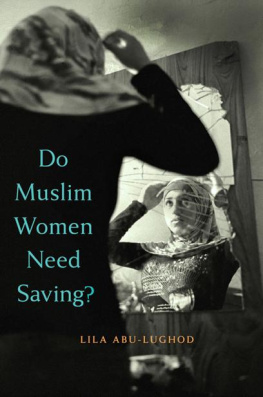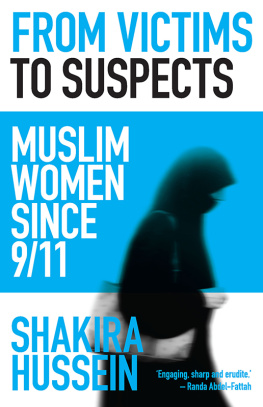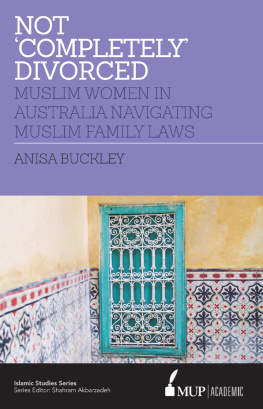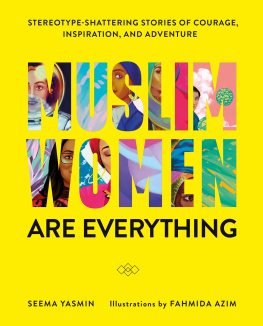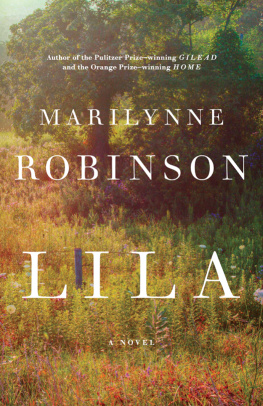Lila Abu-Lughod - Do Muslim Women Need Saving?
Here you can read online Lila Abu-Lughod - Do Muslim Women Need Saving? full text of the book (entire story) in english for free. Download pdf and epub, get meaning, cover and reviews about this ebook. year: 2013, publisher: Harvard University Press, genre: Home and family. Description of the work, (preface) as well as reviews are available. Best literature library LitArk.com created for fans of good reading and offers a wide selection of genres:
Romance novel
Science fiction
Adventure
Detective
Science
History
Home and family
Prose
Art
Politics
Computer
Non-fiction
Religion
Business
Children
Humor
Choose a favorite category and find really read worthwhile books. Enjoy immersion in the world of imagination, feel the emotions of the characters or learn something new for yourself, make an fascinating discovery.
- Book:Do Muslim Women Need Saving?
- Author:
- Publisher:Harvard University Press
- Genre:
- Year:2013
- Rating:4 / 5
- Favourites:Add to favourites
- Your mark:
- 80
- 1
- 2
- 3
- 4
- 5
Do Muslim Women Need Saving?: summary, description and annotation
We offer to read an annotation, description, summary or preface (depends on what the author of the book "Do Muslim Women Need Saving?" wrote himself). If you haven't found the necessary information about the book — write in the comments, we will try to find it.
Do Muslim Women Need Saving? — read online for free the complete book (whole text) full work
Below is the text of the book, divided by pages. System saving the place of the last page read, allows you to conveniently read the book "Do Muslim Women Need Saving?" online for free, without having to search again every time where you left off. Put a bookmark, and you can go to the page where you finished reading at any time.
Font size:
Interval:
Bookmark:
Do Muslim Women Need Saving?
Do Muslim Women Need Saving?
Lila Abu-Lughod
HARVARD UNIVERSITY PRESS
Cambridge, Massachusetts & London, England
2013
Copyright 2013 by the President and Fellows of Harvard College
All rights reserved
Jacket photograph copyright Rania Matar
Author photograph by Eileen Barroso
Jacket design by Lisa Roberts
The Library of Congress has cataloged the printed edition as follows:
Abu-Lughod, Lila.
Do Muslim women need saving? / Lila Abu-Lughod.
pages cm
Includes bibliographical references and index.
ISBN 978-0-674-72516-4 (alk. paper)
1. Muslim womenSocial conditions. 2. Muslim womenCivil rights. 3. Womens rightsIslamic countries. I. Title.
HQ1170.A346 2013
305.48'697dc23 2013005846
For my mother,
who watched me struggle
CONTENTS
Introduction:
Conclusion:
Introduction
On a bright December day in 2010, I was having tea with Zaynab, a woman who lives in a village in southern Egypt. I had known her for many years, and as we caught up on each others news, she politely asked me about the subject of my new research. I explained that I was writing a book about how people in the West believe that Muslim women are oppressed. Zaynab objected, But many women are oppressed! They dont get their rights in so many waysin work, in schooling, in
I was surprised by her vehemence. But is the reason Islam? I asked. They believe that these women are oppressed by Islam.
It was Zaynabs turn to be shocked. What? Of course not! Its the government, she explained. The government oppresses women. The government doesnt care about the people. It doesnt care that they dont have work or jobs, that prices are so high that no one can afford anything. Poverty is hard. Men suffer from this too.
This was just three weeks before the day that Egyptians took to the streets and the world watched, riveted, as they demanded rights, dignity, and the end of the regime that had ruled for thirty years. Zaynab had a particular reason for her anger that day. I had arrived that morning to find her household in distress. The caf that had been made out of the old living room of her house was shuttered. Inside, her son lay on the couch, despondent. He was the one who ran the caf; the youngest of her sons, he was practical and hardworking. He had been a bright and eager kid when we first met him, watching closely when my husband helped Zaynab fix her washing machine and delighting us with the motor-driven toys he made. He had always been the first to hitch the donkey cart to go off to get fodder for the sheep and water buffalo that Zaynab had kept for milk and income.
Zaynab had just returned from the police station and she was agitated. She had gone to find out why they had picked up the boy who helped her son in the caf. She explained what had happened. The local security officer had come in demanding breakfast. Another customer was served first. It seems that the security officers and the military police came in regularly, or sent an underling to get them food. Zaynab dramatically described all the good food her son would prepare for them: fava beans smothered in real clarified butter, eggs, cheese, pickles, and a mountain of bread. They never offered the full price; sometimes they didnt pay at all. This time, they had the waiter arrested.
As she drank strong tea for her headache, I tried to cheer up the family by making a facetious suggestion. How about posting their menu and prices on a board so that everyone would know what things cost? And to shame the police and military, have a second column listing the special discounted prices just for them. Neither Zaynab nor her son was amused. They were tired of this harassment.
The problem, Zaynab explained, was that no one dared stand up to them. With just a word, these men could have her shop or caf closed down. She already had to pay off the security police and the tourist police daily. I had seen Zaynab seethe when the uniformed men or plainclothes police came by asking for packets of cigarettes and then refused to pay. They saw her as an ignorant peasant, her face dark with years of work in the fields, her black robes marking her as uneducated. They knew she was powerless. No wonder she blamed the government for womens oppression.
I had been close to Zaynab and her family for almost twenty years. Her youngest child was the same age as my twins; we had met when they were infants. I admired the way Zaynab had raised her children and run the household more or less on her own. Her husband had left to find work in Cairo, as did so many from this depressed region, and only returned for short vacations. Intelligent and knowledgeable about everything from poetic funeral laments to the economics of farming, she had been indefatigable in building a good life for her family. In recent years, when her children were old enough to help, she finally was able to capitalize on her location, which was near the buses that brought tourists to her hamlet to visit a well-preserved Pharaonic temple. She set up a small kiosk selling cigarettes, batteries, and chewing gum, and then expanded to sell bottled water, sodas, and snacks. Endlessly moving things indoors and out, serving customers, arranging for supplies, applying for permits, and paying bribes and fines, the headaches were regular and the income inconsistent.
Zaynabs individual circumstances are unique, of course. She lives in a poor region of Egypt. Her marriage had not been ideal. Active and independent, she had a head for business and managed a complicated farming enterprise more or less on her own for years. She regretted that she had never gone to schoolmany girls didnt when she was growing upbut she was sharp and wondered why she seemed to understand more about the world than her children, all of whom had gone to school.
Yet her reaction to the subject of my book on the Muslim woman confirmed something I had seen across the Arab world. She lived with hardships, but she was always thinking about how to do the best for her family. She was keenly aware of the political circumstances that shaped her life and her possibilities, whether they came from a security state or from being part of the international tourist economy. Her shock at my suggestion that anyone would think she was oppressed by her religion was significant. Like so many women I have known across the Arab worldfrom university professors and businesswomen to villagersher identity as a Muslim is deeply meaningful to her, and her faith in God is integral to her sense of self and community.
Because I have known women like Zaynab through my years doing ethnographic research, I am often bewildered by what I read or hear about the Muslim woman. It is hard to reconcile my experiences with the women I have met in rural Egypt with what the American media present, or with what people say to me casually at dinner parties, in doctors offices, and on the sidelines at my childrens soccer games when they learn that I write about the Middle East. I am surprised by how easily people presume that Muslim women do not have rights.
This book is the result of my intellectual journey to make sense of the disjuncture between my experiences and these public attitudes. When defending the rights of Muslim women was offered as part of the justification for U.S. military intervention in Afghanistan in 2001, I had already spent twenty years writing about womens lives in various communities in Egypt. In the late 1970s, I lived for two years in a Bedouin community in Egypts Western Desert. I was then a graduate student in anthropology doing fieldwork for my dissertation. The book I eventually published based on this experience was called Veiled Sentiments. It presented the surprising things that the poems so precious to women in this community could tell us about how they feltabout men, relationships, and life. The women who expressed themselves through poignant oral poetry first taught me just how complicated cultural and moral life was in at least one Arab Muslim community.
Next pageFont size:
Interval:
Bookmark:
Similar books «Do Muslim Women Need Saving?»
Look at similar books to Do Muslim Women Need Saving?. We have selected literature similar in name and meaning in the hope of providing readers with more options to find new, interesting, not yet read works.
Discussion, reviews of the book Do Muslim Women Need Saving? and just readers' own opinions. Leave your comments, write what you think about the work, its meaning or the main characters. Specify what exactly you liked and what you didn't like, and why you think so.

